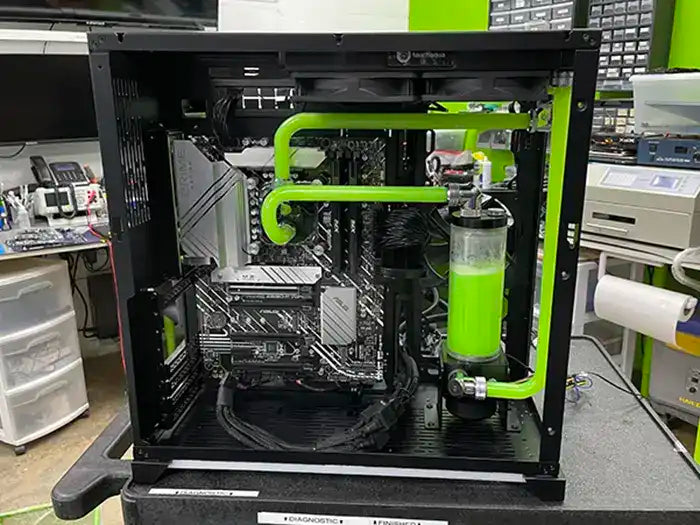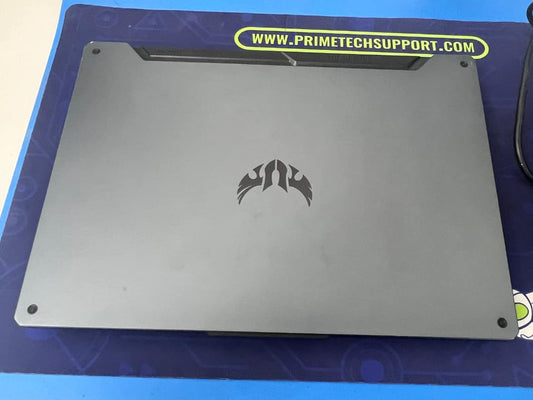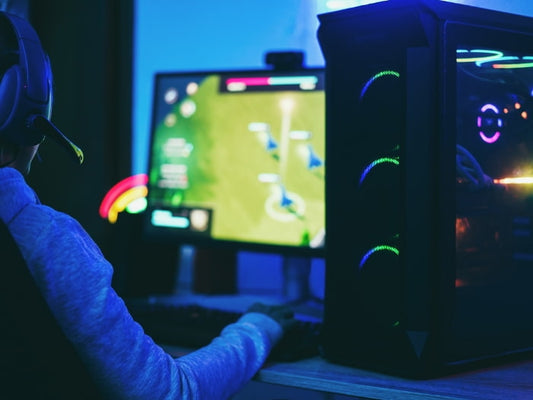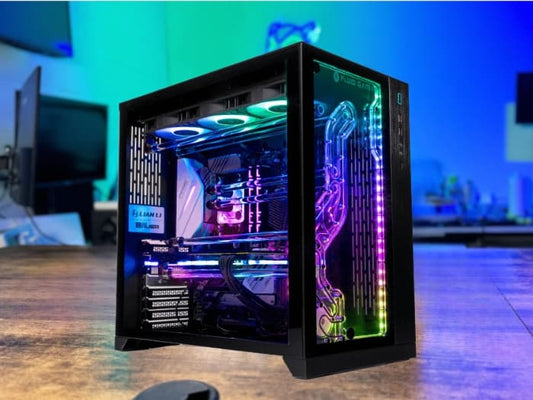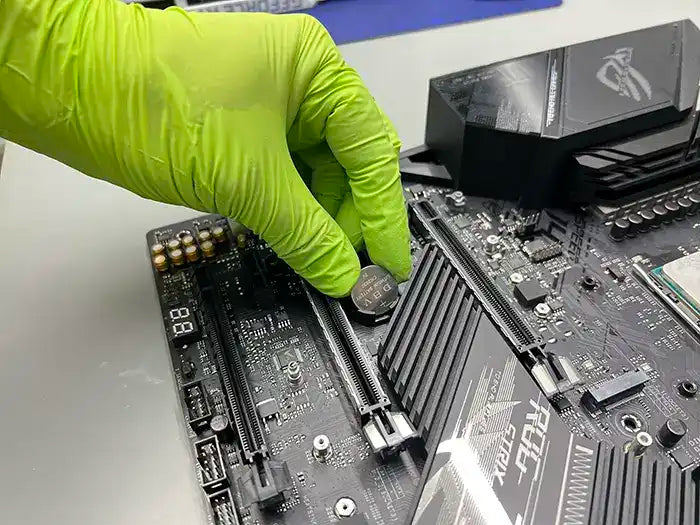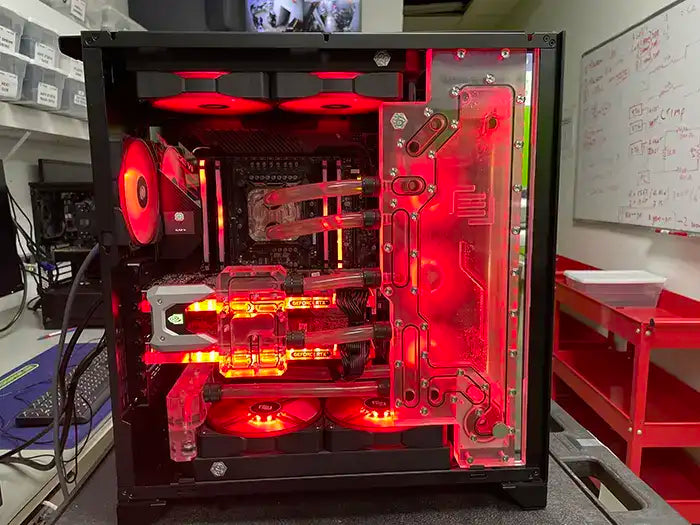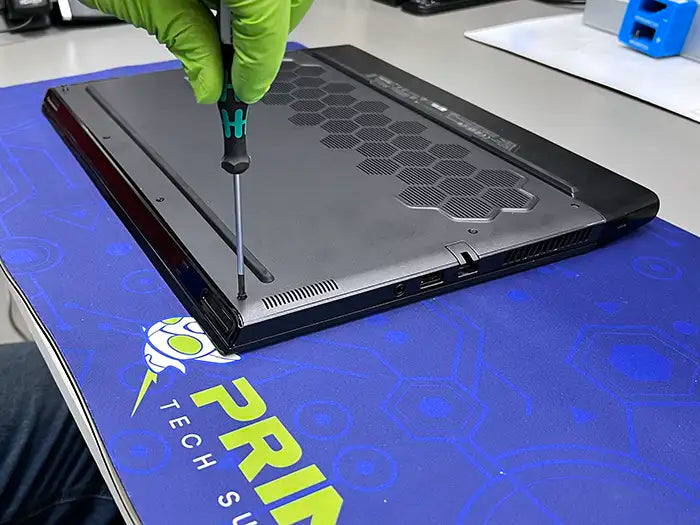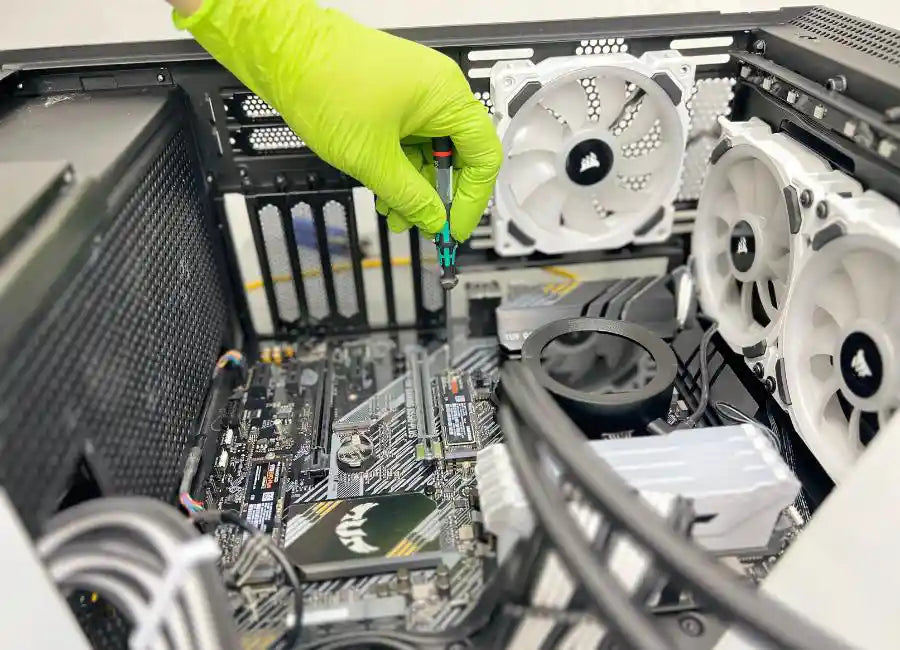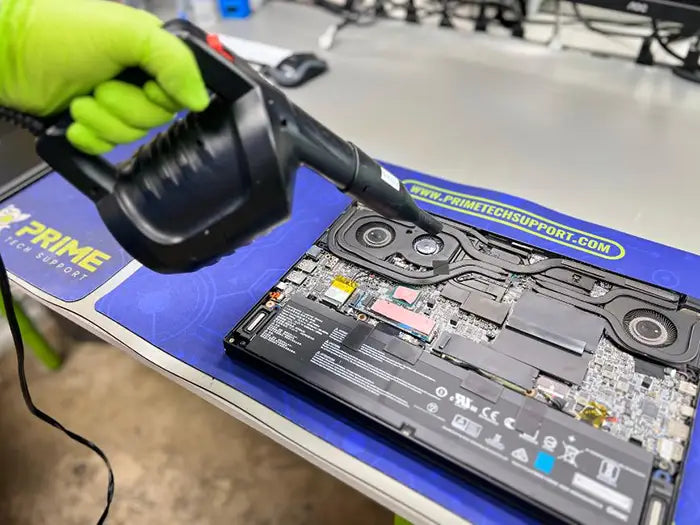AMD vs. Intel Processors for Gaming: Unveiling the Differences for Miami Gamers
Table of Contents
🧠 Introduction: AMD vs Intel in 2025
When you're building or upgrading your gaming PC, one of the most important choices you'll face is deciding between AMD and Intel processors. This debate has been ongoing for years, and in 2025, the competition is fiercer than ever. AMD’s Ryzen 7000 series and Intel’s 14th Gen Raptor Lake Refresh CPUs both offer outstanding performance — but the right choice depends on your gaming habits, multitasking needs, and the kind of system you want to build.
For gamers in Miami, there's another layer to consider: the subtropical climate. High-performance hardware needs efficient thermal management, and not all processors are created equal when it comes to heat output and power consumption. Whether you're gaming in a room with air conditioning or dealing with the heat during the summer, your CPU’s efficiency could impact both performance and longevity.
This guide breaks down the most important differences between AMD and Intel in today’s gaming landscape — including FPS comparisons, core and thread advantages, power efficiency, pricing, and future upgrade potential. Whether you're aiming for fast-paced competitive shooters or demanding open-world titles, we’ll help you choose the best processor for your specific gaming goals — with recommendations tailored to Miami gamers.
🎮 Gaming Performance: FPS and Real-World Benchmarks
When it comes to pure gaming performance in 2025, both AMD and Intel offer high-end processors capable of pushing triple-digit frame rates in demanding titles. However, differences emerge depending on the game engine, resolution, and GPU pairing.
Intel’s 14th Gen chips, like the Core i7-14700K and i9-14900K, continue to lead in single-core performance, giving them an edge in esports and CPU-intensive games such as Counter-Strike 2 or StarCraft II. These CPUs are often the go-to for competitive gamers chasing the highest FPS at 1080p.
On the other hand, AMD’s Ryzen 7000 series, especially the Ryzen 7 7800X3D and Ryzen 9 7950X3D, dominate in games that benefit from large cache sizes. Titles like Hogwarts Legacy, Elden Ring, and Cyberpunk 2077 see better minimum and average FPS with AMD’s 3D V-Cache technology, especially at 1440p and 4K resolutions.
📊 Real-World Example
According to benchmarks from PC Gamer, the Ryzen 7 7800X3D consistently outperforms Intel’s top-tier CPUs in gaming-focused scenarios, particularly when paired with GPUs like the RTX 4090. Meanwhile, Intel remains slightly stronger in workloads that combine gaming and productivity.
🧪 Multitasking & Streaming Performance: Which CPU Handles More?
When it comes to multitasking and streaming, 🧠 CPU architecture, core/thread count, and overall efficiency play a massive role in ensuring smooth performance. In 2025, both AMD and Intel have taken significant steps to enhance these aspects in their latest processor generations, making them capable not only for high-end gaming 🎮 but also for handling intensive background tasks like live streaming 📺, recording 🎥, and content creation ✍️.
💻 Intel’s 14th Gen processors, especially the Core i9-14900K, leverage a hybrid architecture that combines Performance (P) cores for heavy workloads and Efficiency (E) cores for background processes. This allows for better task distribution, where streaming software, background apps like Discord 💬, and browser tabs 🌐 can run seamlessly without impacting in-game FPS. This makes Intel particularly appealing for gamers who stream on platforms like Twitch or YouTube 📡 while gaming at high resolutions.
🔥 AMD’s Ryzen 7000 series, led by the Ryzen 9 7950X, features a unified multi-core architecture with high base and boost clock speeds. With 16 cores and 32 threads, it's especially strong in multi-threaded workloads such as video rendering 🧾, encoding, and live streaming using tools like OBS Studio 🛠️. AMD chips often show more consistent performance across all active threads, making them ideal for users who simultaneously stream, record, and even edit content 🎬.
Additionally, AMD’s support for PCIe 5.0 and DDR5 RAM ensures fast data access 🚀 and reduced bottlenecks during content creation and multitasking scenarios.
Whether you're gaming, streaming, editing video, or running multiple productivity apps at once, both AMD and Intel now offer processors that can handle it all. The choice depends on whether you prioritize raw multi-core performance (AMD 🟥) or prefer the efficiency and task-balancing strengths of a hybrid architecture (Intel 🔷).
If you're looking to dive deeper into how AMD and Intel name their processors and what each number and letter in the model names really means, be sure to check out our guide on Decoding CPU Names: Understanding AMD & Intel's Nomenclature. Understanding these naming conventions can help you make more informed decisions when choosing a CPU for your gaming rig.
Schedule a Gaming PC Hardware Upgrade Today!
💸 Multitasking & Streaming Performance: Which CPU Handles More?
When considering multitasking and streaming, both CPU architecture and core/thread count are essential. Below is a comparison between Intel and AMD processors, showcasing their strengths in handling multitasking, live streaming, and content creation in 2025.
| Feature | Intel Core i9-14900K (Hybrid Architecture) | AMD Ryzen 9 7950X (Unified Architecture) |
| Core Count | 24 (8 Performance + 16 Efficiency cores) | 16 cores, 32 threads |
| Threads | 32 threads | 32 threads |
| Base Clock Speed | 3.2 GHz (Performance cores) | 4.5 GHz |
| Boost Clock Speed | 5.8 GHz (Performance cores) | 5.7 GHz |
| Multitasking Performance | Great for handling multiple background apps like OBS, Discord, and browsers simultaneously | Excellent at handling content creation and multitasking with high clock speeds |
| Streaming Performance | Best for live streaming with lower latency due to hybrid architecture | Handles creative workloads and high-resolution editing easily with powerful multi-core processing |
| Best Use Case | Gaming while streaming with other apps running | Video editing, live streaming, and content creation along with gaming |
Key Takeaways:
- Intel shines in live streaming scenarios, especially when handling multiple background applications like Discord or OBS.
- AMD is better suited for content creators who need raw processing power for multitasking, video editing, and gaming.
Common Gaming PC Issues: Expert Tips from Your Local Miami Gaming PC Repair Specialist
🛠️ Platform Longevity and Upgrade Potential
When selecting a CPU, it’s not only important to consider its performance for gaming today but also its potential for future upgrades. Both AMD and Intel offer platforms that allow you to upgrade your processor, but the longevity of each brand’s platform can differ.
AMD Platform Longevity
AMD has a strong reputation for providing long-term support for its chipsets. For example, the AM4 socket supported multiple generations of Ryzen processors, allowing users to upgrade their CPUs without needing to change their motherboards. In 2025, with the introduction of the AM5 socket, AMD continues this trend by offering backward and forward compatibility for several Ryzen 7000 series chips. This means that users can enjoy high-end performance today while having the option to upgrade to newer processors in the future without needing to overhaul their entire system.
Intel Platform Longevity
Intel’s approach to platform longevity has traditionally been less flexible compared to AMD’s. For instance, Intel’s LGA 1700 socket supports 12th and 13th gen CPUs (Alder Lake and Raptor Lake), but they are expected to be replaced by new sockets with future releases. Although Intel CPUs offer excellent performance, frequent changes in motherboard compatibility can make upgrades more expensive and complicated for users.
Upgrade Potential
- AMD: Known for offering more upgrade-friendly platforms, especially for those who want to extend their system's lifespan. Their decision to maintain socket compatibility across multiple generations (like with AM4) gives AMD users more freedom to upgrade without needing to replace the motherboard every time a new CPU is released.
- Intel: Generally, Intel processors require new motherboards with each new generation, meaning users may need to replace both their processor and motherboard for a significant upgrade. However, Intel’s high-performance chips tend to remain competitive for several years, even with newer generations.
Final Thoughts on Longevity and Upgrades
If you’re looking for future-proofing and flexibility, AMD stands out for its long-term support and the ease of upgrading your system without replacing key components. Intel, on the other hand, is better suited for users who prioritize cutting-edge performance and don’t mind upgrading more frequently to stay ahead of the curve.
For more on AMD’s AM4 platform longevity and upgrade potential, check out this article from PC Gamer. It explores how AMD has made the AM4 socket a lasting option for gamers looking to upgrade without changing their motherboard. Read more on PC Gamer.
DIY Tips for Building and Repairing Your Gaming PC in Miami
💬 Miami Gamer Perspective: Local Use Cases and Builds
When choosing a CPU for gaming in Miami, it's important to consider local use cases, including the types of games you play, your budget, and the climate. Miami's warm weather makes it vital to choose components that can handle higher temperatures, especially for extended gaming sessions. Local preferences also tend to lean towards graphics-intensive games, such as AAA titles, esports, and VR, requiring both powerful GPUs and CPUs.
Miami gamers often prioritize system longevity, aiming for PCs that can run the latest games smoothly for years. It’s also common for local enthusiasts to create custom gaming rigs with high overclocking potential and efficient cooling solutions. In this tropical environment, proper airflow and cooling systems are essential for maintaining optimal performance.
Additionally, considering local retailers and repair services is key. Local support from businesses like Prime Tech Support can offer personalized recommendations for gaming PC builds suited to Miami's gaming community. If you’re interested in building or upgrading a system for the Miami climate, this approach will ensure your gaming PC delivers both performance and durability.
Book a Gaming PC Hardware Upgrade Today!
✅ Conclusion: Which CPU Should You Choose in 2025?
In 2025, selecting the right CPU hinges on your specific gaming needs, budget, and future upgrade plans.
- AMD Ryzen 9 9950X3D: Ideal for gamers and creators seeking top-tier performance, this 16-core processor offers exceptional gaming and multitasking capabilities, thanks to its 3D V-Cache technology and high clock speeds.
- Intel Core Ultra 9 285K: Suited for those who prioritize single-threaded performance and overclocking potential. Intel's Arrow Lake architecture introduces advanced features like AI integration and enhanced connectivity.
For gamers in Miami, considering local climate and power efficiency is crucial. AMD's Ryzen series, with its efficient power consumption and platform longevity, may offer better value and future-proofing.
Ultimately, both AMD and Intel offer compelling choices. Your decision should align with your specific gaming preferences, performance requirements, and budget considerations.
SAME-DAY REPAIRS
Gaming PC Diagnostic
Fast tech support for Gaming Computers. We exceed customer expectations and ensure satisfaction.
